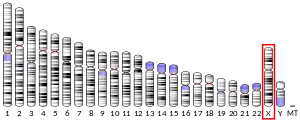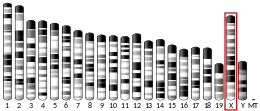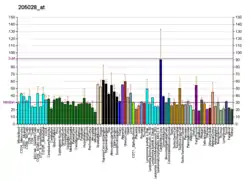| TRO | |||||||||||||||||||||||||||||||||||||||||||||||||||
|---|---|---|---|---|---|---|---|---|---|---|---|---|---|---|---|---|---|---|---|---|---|---|---|---|---|---|---|---|---|---|---|---|---|---|---|---|---|---|---|---|---|---|---|---|---|---|---|---|---|---|---|
| Identifiers | |||||||||||||||||||||||||||||||||||||||||||||||||||
| Aliases | TRO, MAGE-d3, MAGED3, trophinin | ||||||||||||||||||||||||||||||||||||||||||||||||||
| External IDs | OMIM: 300132 MGI: 1928994 HomoloGene: 75113 GeneCards: TRO | ||||||||||||||||||||||||||||||||||||||||||||||||||
| |||||||||||||||||||||||||||||||||||||||||||||||||||
| |||||||||||||||||||||||||||||||||||||||||||||||||||
| |||||||||||||||||||||||||||||||||||||||||||||||||||
| |||||||||||||||||||||||||||||||||||||||||||||||||||
| |||||||||||||||||||||||||||||||||||||||||||||||||||
| Wikidata | |||||||||||||||||||||||||||||||||||||||||||||||||||
| |||||||||||||||||||||||||||||||||||||||||||||||||||
Trophinin is a protein that in humans is encoded by the TRO gene.[5][6][7]
This gene encodes a membrane protein that mediates apical cell adhesion between trophoblastic cells and luminal epithelial cells of the endometrium and is implicated in the initial attachment during the process of embryo implantation. This gene is related to the MAGED gene family by sequence similarity and chromosome location. Multiple alternatively spliced transcript variants have been found for this gene; however, the full-length nature of some variants has not been defined.[7]
References
- 1 2 3 GRCh38: Ensembl release 89: ENSG00000067445 - Ensembl, May 2017
- 1 2 3 GRCm38: Ensembl release 89: ENSMUSG00000025272 - Ensembl, May 2017
- ↑ "Human PubMed Reference:". National Center for Biotechnology Information, U.S. National Library of Medicine.
- ↑ "Mouse PubMed Reference:". National Center for Biotechnology Information, U.S. National Library of Medicine.
- ↑ Pack SD, Tanigami A, Ledbetter DH, Sato T, Fukuda MN (Apr 1998). "Assignment of trophoblast/endometrial epithelium cell adhesion molecule trophinin gene TRO to human chromosome bands Xp11.22→p11.21 by in situ hybridization". Cytogenet Cell Genet. 79 (1–2): 123–4. doi:10.1159/000134698. PMID 9533028.
- ↑ Chomez P, De Backer O, Bertrand M, De Plaen E, Boon T, Lucas S (Jul 2001). "An overview of the MAGE gene family with the identification of all human members of the family". Cancer Res. 61 (14): 5544–51. PMID 11454705.
- 1 2 "Entrez Gene: TRO trophinin".
Further reading
- Fukuda MN, Nozawa S (2000). "Trophinin, tastin, and bystin: a complex mediating unique attachment between trophoblastic and endometrial epithelial cells at their respective apical cell membranes". Semin. Reprod. Endocrinol. 17 (3): 229–34. doi:10.1055/s-2007-1016230. PMID 10797941. S2CID 260319642.
- Fukuda MN, Sato T, Nakayama J, et al. (1995). "Trophinin and tastin, a novel cell adhesion molecule complex with potential involvement in embryo implantation". Genes Dev. 9 (10): 1199–210. doi:10.1101/gad.9.10.1199. PMID 7758945.
- Maruyama K, Sugano S (1994). "Oligo-capping: a simple method to replace the cap structure of eukaryotic mRNAs with oligoribonucleotides". Gene. 138 (1–2): 171–4. doi:10.1016/0378-1119(94)90802-8. PMID 8125298.
- Bonaldo MF, Lennon G, Soares MB (1997). "Normalization and subtraction: two approaches to facilitate gene discovery". Genome Res. 6 (9): 791–806. doi:10.1101/gr.6.9.791. PMID 8889548.
- Suzuki Y, Yoshitomo-Nakagawa K, Maruyama K, et al. (1997). "Construction and characterization of a full length-enriched and a 5'-end-enriched cDNA library". Gene. 200 (1–2): 149–56. doi:10.1016/S0378-1119(97)00411-3. PMID 9373149.
- Suzuki N, Zara J, Sato T, et al. (1998). "A cytoplasmic protein, bystin, interacts with trophinin, tastin, and cytokeratin and may be involved in trophinin-mediated cell adhesion between trophoblast and endometrial epithelial cells". Proc. Natl. Acad. Sci. U.S.A. 95 (9): 5027–32. Bibcode:1998PNAS...95.5027S. doi:10.1073/pnas.95.9.5027. PMC 20207. PMID 9560222.
- Suzuki N, Nakayama J, Shih IM, et al. (1999). "Expression of trophinin, tastin, and bystin by trophoblast and endometrial cells in human placenta". Biol. Reprod. 60 (3): 621–7. doi:10.1095/biolreprod60.3.621. PMID 10026108.
- Kikuno R, Nagase T, Ishikawa K, et al. (1999). "Prediction of the coding sequences of unidentified human genes. XIV. The complete sequences of 100 new cDNA clones from brain which code for large proteins in vitro". DNA Res. 6 (3): 197–205. doi:10.1093/dnares/6.3.197. PMID 10470851.
- Wang HY, Xing FQ, Chen SL (2002). "Expression of trophinin in the cycling endometrium and its association with infertility". Di Yi Jun Yi da Xue Xue Bao. 22 (6): 539–41. PMID 12297480.
- Strausberg RL, Feingold EA, Grouse LH, et al. (2003). "Generation and initial analysis of more than 15,000 full-length human and mouse cDNA sequences". Proc. Natl. Acad. Sci. U.S.A. 99 (26): 16899–903. Bibcode:2002PNAS...9916899M. doi:10.1073/pnas.242603899. PMC 139241. PMID 12477932.
- Imabayashi H, Mori T, Gojo S, et al. (2003). "Redifferentiation of dedifferentiated chondrocytes and chondrogenesis of human bone marrow stromal cells via chondrosphere formation with expression profiling by large-scale cDNA analysis". Exp. Cell Res. 288 (1): 35–50. doi:10.1016/S0014-4827(03)00130-7. PMID 12878157.
- Nakayama J, Aoki D, Suga T, et al. (2004). "Implantation-dependent expression of trophinin by maternal fallopian tube epithelia during tubal pregnancies: possible role of human chorionic gonadotrophin on ectopic pregnancy". Am. J. Pathol. 163 (6): 2211–9. doi:10.1016/S0002-9440(10)63579-1. PMC 1892375. PMID 14633596.
- Ota T, Suzuki Y, Nishikawa T, et al. (2004). "Complete sequencing and characterization of 21,243 full-length human cDNAs". Nat. Genet. 36 (1): 40–5. doi:10.1038/ng1285. PMID 14702039.
- Bertrand M, Huijbers I, Chomez P, De Backer O (2005). "Comparative expression analysis of the MAGED genes during embryogenesis and brain development". Dev. Dyn. 230 (2): 325–34. doi:10.1002/dvdy.20026. PMID 15162511.
- Ross MT, Grafham DV, Coffey AJ, et al. (2005). "The DNA sequence of the human X chromosome". Nature. 434 (7031): 325–37. Bibcode:2005Natur.434..325R. doi:10.1038/nature03440. PMC 2665286. PMID 15772651.
- Rual JF, Venkatesan K, Hao T, et al. (2005). "Towards a proteome-scale map of the human protein-protein interaction network". Nature. 437 (7062): 1173–8. Bibcode:2005Natur.437.1173R. doi:10.1038/nature04209. PMID 16189514. S2CID 4427026.
- Aoyama J, Nakayama Y, Sugiyama D, et al. (2006). "Apical cell adhesion molecule, trophinin, localizes to the nuclear envelope". FEBS Lett. 579 (28): 6326–32. doi:10.1016/j.febslet.2005.10.012. PMID 16288751. S2CID 20457063.
This article is issued from Wikipedia. The text is licensed under Creative Commons - Attribution - Sharealike. Additional terms may apply for the media files.






